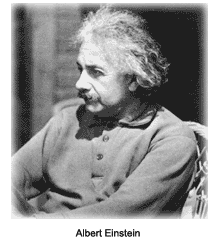Albert Einstein was the most famous physicist of the 20th century, and perhaps of all time. His extraordinary insights into the nature of space and time revolutionized physics.
As the century wore on, Einstein found himself drifting out of the mainstream, as physics began to be dominated by quantum mechanics in a manner that Einstein found philosophically unacceptable. However, he retained such prestige that his letter to Franklin D. Roosevelt in 1939 persuaded Roosevelt to establish the Manhattan Project and develop the first atomic bomb.
 Early Years
Early Years
Einstein was born at Ulm, in Württemberg, Germany, on March 14, 1879. His academic life was not a complete success. He attempted to enroll in a Zurich technical school in 1895, but failed the entrance examination. He attended the Swiss Federal Polytechnic School to train as an instructor in mathematics and physics, but as no teaching position was available when he graduated in 1901, he went to work in the Swiss Patent Office.
Einstein's Theories
Here, working alone in his spare time, he wrote three articles that appeared in 1905, all of them showing tremendous insight. His work on the photoelectric effect and Brownian motion would have been enough to ensure a place among the world`s top physicists, but the most astonishing paper was that announcing his Theory of Special relativity. Although not immediately recognized for what it was, the theory revolutionized the concept of Newtonian mechanics and abolished the concepts of absolute space and absolute time.
Einstein`s work earned him increasingly higher academic positions, including a professorship in Prague in 1911 and at the University of Berlin in 1914. In 1916, Einstein published his General Theory of Relativity, which described gravitation. His theory that light would bend near great concentrations of mass was tested by Eddington during a solar eclipse in 1919 and shown to be correct. From this point, his worldwide reputation was assured.
Einstein in America
Einstein acquired German citizenship in, 1914 but renounced it in 1933, upon the accession to power of Adolf Hitler. He left for the United States, where he was welcomed at Princeton University. At the urging of such other physicists as Leo Szilard and Enrico Fermi, Einstein wrote to Roosevelt in 1939, explaining the danger posed by German research in fission and the possibility that the Nazis would produce a new weapon of incomparable destructive power. Earlier attempts by Fermi to convince the Navy Department of the danger had been unproductive, but Einstein was held in the highest regard by the administration. Einstein`s letter to Roosevelt was delivered on October 11, 1939. Within a month, the President had established a research committee. The eventual result was that Roosevelt created The Manhattan Project.
Einstein remained at Princeton until his retirement in 1945. He had become a U.S. citizen in 1940. He died of heart failure in Princeton on April 18, 1955.